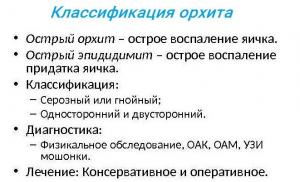Eli p complex women's reproductive health. Interpretation of ELI-Viscero-Test data (general algorithms)
Nomenclature of the Ministry of Health of the Russian Federation (Order No. 804n): A12.06.010.010 "Determination of antibodies to 12 antigens for the diagnosis of women's reproductive health (ELI-P-Complex-12)"
Biomaterial: Blood serum
Completion time (in the laboratory): 7 w.d. *
Description
A laboratory study aimed at assessing specific (marker) antibodies to specific antigens, the increase of which may indicate the development of pathology of the woman’s reproductive system.
This study is suitable both for women planning pregnancy - to clarify the state of the immune link in the regulation of embryogenesis, and for women in the early stages of pregnancy, to identify risk groups for the pathological course of pregnancy.
- Human chorionic gonadotropin (hCG). A peptide hormone necessary for the attachment of a fertilized egg to the wall of the uterus (nidation) and the development of the placenta. An excess of antibodies to hCG reflects the presence of hormonal disorders, leads to functional deficiency of this hormone and is accompanied by disturbances in nidation and placental formation. Excessive production of antibodies to hCG is often provoked by IVF procedures, especially repeated ones.
- Double-stranded DNA. Component of nucleated cells; its excess in the circulation indicates activation of apoptosis processes, most often caused by actively replicating intracellular infections. Excess extracellular DNA induces the production of anti-DNA antibodies.
- Beta-2-glycoprotein I. The main phospholipid-binding protein in serum. An excess of antibodies to it is a characteristic sign of antiphospholipid syndrome, accompanied by the development of microthrombosis of the blood vessels of the placenta and other organs.
- Fc fragment of immunoglobulins. A fragment of any antibody molecule. Antibodies to it are called “rheumatoid factor”. An increase in the synthesis of such antibodies often indicates inflammatory processes (of any localization).
- Collagen. The main protein of the connective tissue matrix. An excess of antibodies to collagen in women of fertile age is often a sign of inflammatory processes in the endometrium or other pelvic organs, accompanied by adhesive changes. May be a sign of systemic autoimmune processes.
- Protein S100. Participates in the regulation of many functions and, in particular, in the regulation of apoptosis processes, important for the development of the embryo. An excess of antibodies to S100 can lead to disturbances in the morphogenesis and differentiation of embryonic cells and is often accompanied by arrests in the development of pregnancy. At later stages of fetal development, the S100 protein is involved in the regulation of differentiation and maturation of neuroblasts. Excess antibodies to it can lead to disorders of neurogenesis. The most common cause of excess production of antibodies to S100 is papilloma viruses.
- Antigen Spr-06. Sperm membrane antigen SPR-06 is a protein antigen common to sperm and prostate cells. An excess of antibodies to it is: in men - a sign of changes in the prostate (prostatitis; tumor process); in women - a sign of endometritis or an inflammatory process in other pelvic organs. May lead to decreased fertility.
- Antigen TrM-03. Platelet membrane antigen is a protein antigen, an excess of antibodies to which may be accompanied by changes in blood coagulation in the form of hyper- and hypocoagulation.
- ANCA antigen. Vascular endothelial antigen. An excess of antibodies to it is a characteristic sign of vasculitis (inflammation of the inner wall of blood vessels) of different origins and different localizations.
- Insulin. A specific antigen of the pancreas, an excess of antibodies to which is typical for pregnant women with gestational diabetes, people at risk of developing diabetes and patients with insulin-dependent diabetes mellitus type 1. An excess of antibodies to it is a characteristic sign of pancreatitis.
- Thyroglobulin. A specific antigen of thyroid cells, an excess of antibodies to which is characteristic of patients with thyroiditis of various origins.
- Antigen KiM-05. A specific antigen of kidney cell membranes, an excess of antibodies to which is characteristic of patients with various kidney diseases.
Indications for use
- Women planning pregnancy, primarily those at risk, to determine the state of the immune link in the regulation of embryogenesis 1-3 months before the planned pregnancy.
- Women in the early stages of pregnancy (first trimester) in order to identify patients at high risk for abnormal pregnancy development as early as possible and carry out the necessary treatment and preventive measures.
- Women suffering from infertility of unknown origin, to identify possible disorders in the immune system regulating the development of pregnancy.
Preparing for the study
Blood is drawn on an empty stomach. At least 8 hours should pass between the last meal and blood collection (preferably at least 12 hours). Juice, tea, coffee are not allowed. You can drink water.
Most often ordered with this service
* The website indicates the maximum possible period for completing the study. It reflects the time it takes to complete the study in the laboratory and does not include the time for delivery of the biomaterial to the laboratory.
The information provided is for reference only and is not a public offer. For up-to-date information, contact the Contractor's medical center or call center.
"ELI-P-Complex-12"- allows you to assess the state of a woman’s reproductive health by determining the serum content of autoantibodies to 12 antigens.
"ELI-P-Complex-12" allows you to determine the content of IgG class autoantibodies in the serum, which interact with the following antigens:
- With human chorionic gonadotropin (hCG; this is a peptide hormone, it is necessary to regulate the formation of the placenta).
- With double-stranded DNA (this is a component of nuclear cells; its excess in circulation indicates the activation of apoptosis processes and induces the production of anti-DNA antibodies).
- C beta-2-glycoprotein is the main phospholipid-binding protein in serum. Phospholipids of cell membranes and their DNA are one of the main breakdown products of dying body cells.
- During an increase in the intensity of apoptosis processes, for example, during infectious processes of different localization, or during autoimmune processes, the release of DNA, as well as membrane phospholipids, increases, and this induces a compensatory increase in the synthesis of antibodies to DNA, as well as antibodies to the main phospholipid-binding protein in the serum - beta2-glycoprotein.
- With rheumatoid factor, antibodies to the Fc fragment of immunoglobulins. An increase in their synthesis is accompanied by an increase in the synthesis/disintegration of any antibodies.
- With collagen - the main protein of connective tissue.
- With S100 protein, which is involved in the regulation and ordering of apoptosis processes, and at later stages of fetal development - in regulating the development of neurons in the spinal cord and brain.
- With sperm membrane antigen SPR-06 - a protein antigen common to sperm and prostate cells. Excess antibodies to it can lead to decreased fertility.
- With platelet membrane antigen TrM-03 - a protein antigen, excess antibodies to which can be accompanied by a change in blood clotting ability in the form of hyper- and hypocoagulation.
- With the vascular endothelial antigen ANCA (excess antibodies to it are a characteristic sign of vasculitis).
The methods of the ELI-Test group, aimed at simultaneous quantitative assessment of changes in the content of many natural antibodies of different specificity, make it possible to identify and systematically evaluate such changes.
Indications:
- women who are planning a pregnancy, primarily those who are at risk, in order to find out the state of the immune link in the regulation of embryogenesis one to two months before the planned pregnancy;
- in the early stages of pregnancy (1st trimester) for the earliest possible identification of patients who are at increased risk of abnormal development of pregnancy, in order to carry out the necessary treatment and preventive measures;
- women who suffer from infertility of unknown origin, in order to identify possible disorders in the immune system of regulation of embryogenesis.
It is recommended to donate blood in the morning, between 8 and 11 am. Blood is drawn strictly on an empty stomach (at least 8 and no more than 14 hours of fasting). It is allowed to drink water without gas and sugar. On the eve of the examination, food overload should be avoided.
| DNA | |
| b-2 Glycoprotein 1 | |
| Fc-IgG (rheumatic factor) | |
|
Myocardial antigens (CoM, CoS) |
Signs of dystrophic changes in the myocardium (of any origin) |
| b 1-adrenergic receptors |
1. A sign of changes in the autonomic nervous system of the heart (often accompanied by arrhythmias) 2. Cardiomyopathy (rare) |
| Platelet antigens TrM | |
| ANCA antigens | |
| Lung antigens (LuM, LuS) | Sign of changes in the lung parenchyma (acute and chronic infectious and inflammatory diseases; tumor process) |
| Kidney antigens (KiS, KiM) | |
| Liver antigens (HeS, HMMP) |
1. Sign of changes in the liver parenchyma (acute and chronic infectious and inflammatory diseases; toxic changes; autoimmune changes, tumor process) 2. Inflammatory diseases of the gallbladder |
|
Gastric antigen (GaM) Small intestinal antigen (ItM) |
1. Sign of changes in the wall of the stomach (gastritis, ulcer, tumor process) 2. Sign of changes in the wall of the small intestine (duodenitis, ileitis) |
| Insulin | Sign of changes in the parenchyma of the pancreas (pancreatitis; oncological process) with damage to the islet apparatus (risk group for developing type I diabetes) |
| Insulin receptors | A sign of changes in the insulin receptor apparatus (with type 2 diabetes mellitus or the risk of its development; with insulin resistance) |
| Thyroglobulin | Thyroiditis with expected subsequent hypofunction of the gland |
| TSH receptor | Thyroiditis with expected subsequent hyperfunction of the gland (possible development of diffuse toxic goiter; Graves-Bazedow disease). |
| Adrenal antigen (AdrM-D/C-0) | Sign of changes in the adrenal parenchyma (of any origin); often observed with prolonged stress, infectious, tumor and autoimmune lesions of the adrenal glands |
|
1. In men: Sign of changes in the prostate parenchyma (prostatitis; tumor process) 2. In women: A sign of inflammation in the pelvis, most often of chlamydial etiology; with frequent changes of sexual partners (can cause infertility in women and men, and also lead to the death of an early embryo during IVF) |
|
| Protein S 100 |
2. As a rule, the increase in antibodies to the S100 protein is a consequence and an indication of HPV infection |
| GFAP protein | Signs of gliosis (vascular, post-traumatic or tumor genesis); With pronounced changes, increased convulsive readiness and convulsive syndrome may develop |
| MBP (myelin basic protein) |
1. Signs of neuritis, radiculitis, spinal cord protrusions 2. Less commonly, a sign of an antimyelin process in chronic cases. demyelinating diseases in the acute stage |
0Array ( => Analyzes) Array ( => 2) Array ( =>.html) 2
Antigens ELI-P-Complex
| HCG (choriogonadotropin) |
Sign of anti-hCG syndrome |
| DNA |
1. Active infectious process (usually viral). 2. Rarely - Paraneoplastic reaction (with oncological processes) 3. Rarely - a sign of a systemic autoimmune process |
| b-2 Glycoprotein 1 |
1. Sign of antiphospholipid syndrome 2. Rarely - a sign of a systemic autoimmune process 3. Rarely - Paraneoplastic reaction (with oncological processes) |
| Collagen |
A sign of connective tissue disorders of inflammatory origin (in women, it often accompanies inflammatory processes in the pelvis; |
| Fc-IgG (rheumatic factor) | Sign of a chronic inflammatory process (any location) |
| Insulin | Sign of changes in the parenchyma of the pancreas (pancreatitis) with damage to the islet apparatus (risk group for developing type I diabetes and gestational diabetes) |
| Thyroglobulin | Sign of thyroiditis with expected hypofunction of the gland |
| Protein S 100 |
1. Sign of changes in the central nervous system: accompanied by emotional disturbances (phobias, depression, aggressiveness) 2. As a rule, the increase in antibodies to the S100 protein is a consequence and an indication of HPV infection 3. A common cause of pregnancy arrests, miscarriages and developmental disorders of the fetal nervous system |
| Sperm-prostatic antigen Spr-06 |
In women: A sign of inflammation in the pelvis, more often of chlamydial etiology; |
| Platelet antigen TrM-03 | A sign of thrombocytopathy (may be accompanied by both increased and decreased blood clotting) |
| ANCA antigen | A sign of inflammatory processes in the vascular endothelium (vasculitis, vasculopathy) |
| Kidney antigen (KiM -05) | Sign of changes in the kidney parenchyma (acute and chronic inflammatory kidney diseases; urolithiasis; tumor process) |
Low levels of antibodies to most or all of the test antigens indicate a decrease in overall immunological reactivity. Most often observed with chronic intracellular infections - viral or bacterial, less often - with toxic (work in hazardous industries) or radiation exposure, as well as when taking large doses of immunosuppressive drugs (steroid hormones, chemotherapy for cancer, non-steroidal anti-inflammatory drugs in large doses, many psychotropic drugs).
General generalized immunosuppression is accompanied by a violation of clearance, i.e., removal of apoptosis products (physiological death) of cells from the body and leads to chronic. autointoxication with metabolic products, sharply increases the risk of miscarriage, is accompanied by the development of chronic fatigue syndrome, and increases the risk of developing cancer.
gastroenterology diagnostic complex - 5,360 rubles
 ONLY IN MARCHsaving - 15%
ONLY IN MARCHsaving - 15%
 1000 rubles ECG recording with interpretation
1000 rubles ECG recording with interpretation
 - 25%primary
- 25%primary
Doctor visit
therapist on weekends
 980 rub. initial appointment with a hirudotherapist
980 rub. initial appointment with a hirudotherapist
 appointment with a therapist - 1,130 rubles (instead of 1,500 rubles) "Only in March, on Saturdays and Sundays, appointments with a general practitioner with a 25% discount - 1,130 rubles, instead of 1,500 rubles (diagnostic procedures are paid according to the price list)
appointment with a therapist - 1,130 rubles (instead of 1,500 rubles) "Only in March, on Saturdays and Sundays, appointments with a general practitioner with a 25% discount - 1,130 rubles, instead of 1,500 rubles (diagnostic procedures are paid according to the price list)
Antigens ELI-Cardio-Test
| CoS-05—40 | Sign of functional changes in the myocardium (of various origins) |
| CoM-02 | A sign of dystrophic changes in the myocardium (vascular or infectious-inflammatory origin) |
| Cardiac myosin L | A sign of extensive degenerative changes in the myocardium (vascular or infectious-inflammatory origin) |
| b1-Adrenoreceptor |
1. Signs of changes in the autonomic nervous system of the heart (often accompanied by arrhythmias) 2. Cardiomyopathy (rare) |
| Fc-fragment IgG | Sign of a chronic inflammatory process (any location) |
| Collagen |
2. Rarely - a sign of a systemic autoimmune process |
Antigens ELI-Angio-Test
| Antigen TrM-03 | A sign of thrombocytopathy (may be accompanied by both increased and decreased blood clotting) |
| c-ANCA antigen | Inflammatory processes in the vascular endothelium (vasculitis, vasculopathy) |
| Nitride oxide synthetase (NOS) | NOS is involved in the regulation of vascular tone; an increase in the serum content of antibodies to it is typical for vegetative-vascular dystonia and other forms of disturbances in the regulation of vascular tone |
| Plasminogen/Angiostatin | P/A is involved in fibrinolysis, regulation of vascular growth; the growth of antibodies to it can lead to blood clotting disorders and disrupt the formation of collateral circulation |
| Protein PAPP-A | An increase in the serum content of antibodies to the PAPP-A protein is observed in some obstructive forms of cardiovascular pathology |
| Collagen |
1. A sign of connective tissue disorders of inflammatory origin; 2. Rarely - a sign of a systemic autoimmune process |
Antigens ELI-Vaccino-Test
Antigens ELI-Dia-Test
| Insulin/proinsulin | An increase in AT to insulin/proinsulin in individuals who have not previously received insulin injections is characteristic of existing or developing insulin-dependent diabetes mellitus (DM) type 1 or gestational diabetes mellitus. Increased levels of such antibodies are typical for most people suffering from chronic pancreatitis. |
| Insulin receptors | An increase in antibodies to insulin receptors (IR) is typical for a number of forms of type 2 diabetes. Blocking antibodies to IR cause insulin resistance, and stimulating antibodies cause idiopathic hypoglycemia. |
| NF-200 | |
| GFAP | The GFAP protein is a specific protein of astrocyte filaments; The growth of antibodies accompanies the processes of pathological proliferation of astroglial cells (gliosis). There are reports that an increase in such antibodies may be one of the early marker signs of developing type 1 diabetes |
Antigens ELI-OBM-Test
| OBM | MBP is a protein found in the myelin sheaths of nerve fibers. The growth of AT to it is typical for neuritis (radiculoneuritis). MBP is the main target of pathological autoimmune processes accompanying demyelinating diseases of the nervous system. |
| Fab-fragments AT1 to MBP | The antigen is used to assess the level of anti-idiotypic (AIAT2) antibodies to anti-MBP antibodies (an increase in AIAT2 is typical for long-term antimyelin processes) |
| NF-200 | The NF-200 protein is an axonal specific protein; the growth of antibodies accompanies the processes of degeneration of nerve fibers (including diabetic neuropathy). |
| GFAP | The GFAP protein is a specific protein of astrocyte filaments; The growth of antibodies accompanies the processes of pathological proliferation of astroglial cells (gliosis). |
The ELI-P-Complex-12 method is intended for clinical use in obstetrics, gynecology and immunology to assess the condition of the body of women of childbearing age.
The ELI-P-Complex-12 method is intended for clinical use in obstetrics, gynecology and immunology to assess the state of the reproductive function of women of childbearing age, namely:
- a) in women planning a pregnancy, primarily those at risk, to determine the state of the immune link in the regulation of embryogenesis 1-3 months before the planned pregnancy;
- b) in women in the early stages of pregnancy (first trimester) in order to identify patients who are at high risk for abnormal development of pregnancy as early as possible, and carry out the necessary treatment and preventive measures;
- c) in women suffering from infertility of unknown origin, to identify possible disorders in the immune system regulating the development of pregnancy.
The ELI-P-Complex-12 kit allows you to determine the serum content of IgG class autoantibodies that interact with the following antigens:
Human chorionic gonadotropin(hCG). A peptide hormone necessary for the attachment of a fertilized egg to the wall of the uterus (nidation) and the development of the placenta. An excess of antibodies to hCG reflects the presence of hormonal disorders, leads to functional deficiency of this hormone and is accompanied by disturbances in nidation and placental formation. Excessive production of antibodies to hCG is often provoked by IVF procedures, especially repeated ones.
Double-stranded DNA. Component of nucleated cells; its excess in the circulation indicates activation of apoptosis processes, most often caused by actively replicating intracellular infections. Excess extracellular DNA induces the production of anti-DNA antibodies.
Beta-2-glycoprotein I. Major phospholipid binding protein in serum. Excess antibodies to β2-glycoproteinI– a characteristic sign of antiphospholipid syndrome, accompanied by the development of microthrombosis of the blood vessels of the placenta and other organs.
Fc fragment of immunoglobulins. A fragment of any antibody molecule. Antibodies to it are called « rheumatoid factor". An increase in the synthesis of such antibodies often indicates inflammatory processes (of any localization) .
Collagen. The main protein of the connective tissue matrix. An excess of antibodies to collagen in women of fertile age is often a sign of inflammatory processes in the endometrium or other pelvic organs, accompanied by adhesive changes. May be a sign of systemic autoimmune processes.
Protein S100. Participates in the regulation of many functions and, in particular, in the regulation of apoptosis processes, important for the development of the embryo. An excess of antibodies to S100 can lead to disturbances in the morphogenesis and differentiation of embryonic cells and is often accompanied by arrests in the development of pregnancy. At later stages of fetal development, the S100 protein is involved in the regulation of differentiation and maturation of neuroblasts. Excess antibodies to it can lead to disorders of neurogenesis. The most common cause of excess production of antibodies to S100 is papilloma viruses.
Antigen Spr-06. Sperm membrane antigen SPR-06 a protein antigen common to sperm and prostate cells. An excess of antibodies to it is: in men - a sign of changes in the prostate (prostatitis; tumor process); in women - a sign of endometritis or an inflammatory process in other pelvic organs. May lead to decreased fertility.
Antigen TrM-03. Platelet membrane antigen is a protein antigen, an excess of antibodies to which may be accompanied by changes in blood coagulation in the form of hyper- and hypocoagulation.
ANCA antigen. Vascular endothelial antigen. An excess of antibodies to it is a characteristic sign of vasculitis (inflammation of the inner wall of blood vessels) of different origins and different localizations.
Insulin. A specific antigen of the pancreas, an excess of antibodies to which is typical for pregnant women with gestational diabetes, people at risk of developing diabetes and patients with insulin-dependent diabetes mellitus type 1. An excess of antibodies to it is a characteristic sign of pancreatitis.
Thyroglobulin. A specific antigen of thyroid cells, an excess of antibodies to which is characteristic of patients with thyroiditis of various origins.
Antigen KiM-05. A specific antigen of kidney cell membranes, an excess of antibodies to which is characteristic of patients with various kidney diseases.
Excessive production of antibodies to the antigens used has embryotoxic and embryocidal effects and is one of the most common risk factors for miscarriage/pregnancy arrest.
Rregistration certificate: No. FSR 2009/04550 dated 03/23/09
You can undergo an examination of the body using different versions of “ELI-Tests” (IMMUNCULUS Technology) at the BIOMARKER Clinical Diagnostic Laboratory.
Based on the results of the study, our specialists will prescribe effective methods of prevention and treatment of the identified pathology.
The ELI-P-Complex-12 method is intended for clinical use in obstetrics, gynecology and immunology to assess the state of the reproductive function of women of childbearing age. Namely:
a) in women planning a pregnancy, primarily those at risk, to determine the state of the immune link in the regulation of embryogenesis 1-3 months before the planned pregnancy;
b) in women in the early stages of pregnancy (first trimester) in order to identify patients who are at high risk for abnormal development of pregnancy as early as possible, and carry out the necessary treatment and preventive measures;
c) in women suffering from infertility of unknown origin, to identify possible disorders in the immune system regulating the development of pregnancy.
The ELI-P-Complex-12 kit allows you to determine the serum content of IgG class autoantibodies that interact with the following antigens:
Human chorionic gonadotropin(hCG). A peptide hormone necessary for the attachment of a fertilized egg to the wall of the uterus (nidation) and the development of the placenta. An excess of antibodies to hCG reflects the presence of hormonal disorders, leads to functional deficiency of this hormone and is accompanied by disturbances in nidation and placental formation. Excessive production of antibodies to hCG is often provoked by IVF procedures, especially repeated ones.
Double-stranded DNA. Component of nucleated cells; its excess in the circulation indicates activation of apoptosis processes, most often caused by actively replicating intracellular infections. Excess extracellular DNA induces the production of anti-DNA antibodies.
Beta-2-glycoproteinI. Major phospholipid binding protein in serum. Excess antibodies to β2-glycoproteinI– a characteristic sign of antiphospholipid syndrome, accompanied by the development of microthrombosis of the blood vessels of the placenta and other organs.
Fc fragment of immunoglobulins. A fragment of any antibody molecule. Antibodies to it are called « rheumatoid factor". An increase in the synthesis of such antibodies often indicates inflammatory processes (of any localization) .
Collagen. The main protein of the connective tissue matrix. An excess of antibodies to collagen in women of fertile age is often a sign of inflammatory processes in the endometrium or other pelvic organs, accompanied by adhesive changes. May be a sign of systemic autoimmune processes.
Protein S100. Participates in the regulation of many functions and, in particular, in the regulation of apoptosis processes, important for the development of the embryo. An excess of antibodies to S100 can lead to disturbances in the morphogenesis and differentiation of embryonic cells and is often accompanied by arrests in the development of pregnancy. At later stages of fetal development, the S100 protein is involved in the regulation of differentiation and maturation of neuroblasts. Excess antibodies to it can lead to disorders of neurogenesis. The most common cause of excess production of antibodies to S100 is papilloma viruses.
Antigen Spr-06. Sperm membrane antigen SPR-06 a protein antigen common to sperm and prostate cells. An excess of antibodies to it is: in men - a sign of changes in the prostate (prostatitis; tumor process); in women - a sign of endometritis or an inflammatory process in other pelvic organs. May lead to decreased fertility.
Antigen TrM-03. Platelet membrane antigen is a protein antigen, an excess of antibodies to which may be accompanied by changes in blood coagulation in the form of hyper- and hypocoagulation.
Antigen ANCA. Vascular endothelial antigen. An excess of antibodies to it is a characteristic sign of vasculitis (inflammation of the inner wall of blood vessels) of different origins and different localizations.
Insulin. A specific antigen of the pancreas, an excess of antibodies to which is typical for pregnant women with gestational diabetes, people at risk of developing diabetes and patients with insulin-dependent diabetes mellitus type 1. An excess of antibodies to it is a characteristic sign of pancreatitis.
Thyroglobulin. A specific antigen of thyroid cells, an excess of antibodies to which is characteristic of patients with thyroiditis of various origins.
Antigen KiM-05. A specific antigen of kidney cell membranes, an excess of antibodies to which is characteristic of patients with various kidney diseases.
Excessive production of antibodies to the antigens used has embryotoxic and embryocidal effects and is one of the most common risk factors for miscarriage/pregnancy arrest.
Registration certificate: No. FSR 2009/04550 dated 03/23/09
You can undergo an examination of the body using different versions of “ELI-Tests” (IMMUNCULUS Technology) at our medical center. Based on the results of the study, doctors will prescribe effective methods of prevention and treatment of the identified pathology.













